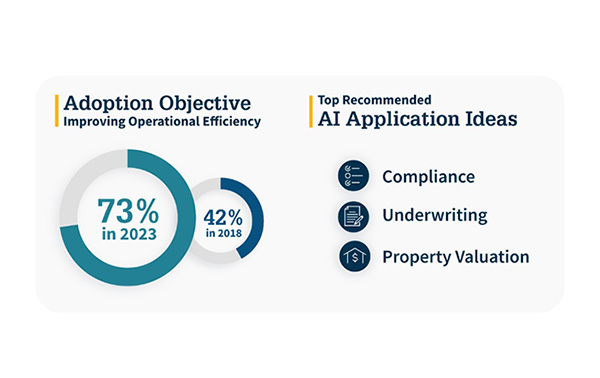
Fannie Mae: Mortgage Lenders Cite Operational Efficiency as Primary AI Motivation

(Illustration courtesy of Fannie Mae)
Mortgage lenders overwhelmingly cited improving operational efficiency as their primary motivation for adopting Artificial Intelligence/Machine Learning, reported Fannie Mae, Washington, D.C.
In a new commentary, Fannie Mae Vice President of Modeling and Data Science Peter Ghavami looked at how lenders’ views and experiences with AI/ML have changed–or remained the same–since the firm last surveyed them in 2018. The commentary also examines proposed applications and potential implications for the mortgage market.
Nearly 75% of lenders cited improving operational efficiency as their primary motivator, compared to 42% in 2018, Fannie Mae reported in a Mortgage Lender Sentiment Survey. Enhancing the borrower experience faded significantly as a top reason, falling to 7% this year from 41% in 2018.
Among the findings:
Mortgage lenders’ current familiarity with AI/ML (65%) was largely consistent with 2018 (63%). Significantly fewer lenders–7%–indicated they’ve deployed the technology in 2023 than in 2018 (14%). “Notably, a significantly greater share in 2023 (22%) did indicate that they’ve started deploying AI/ML on a limited or trial basis compared to 2018 (13%),” Fannie Mae said.
“Among lenders who have not used AI/ML technology, the biggest barriers to adoption in 2023 remained the same,” Fannie Mae said. “These include integration complexity with current infrastructure, lack of proven record of success, and high costs. Mortgage banks were more likely than depository institutions to cite integration complexity as a serious challenge. Data security and privacy concerns have also grown significantly since 2018.” When lenders were asked to recommend AI application ideas for the GSEs to develop for the mortgage industry, they asked for appraisal automation, borrower income/employment verification, data/documentation reconciliation and standardization and compliance management, Fannie Mae said.
